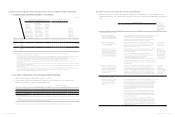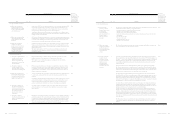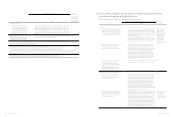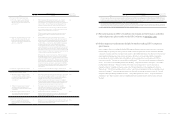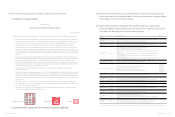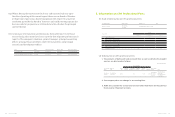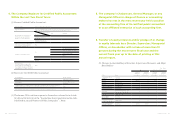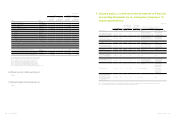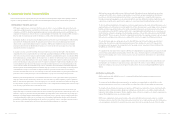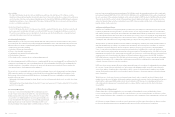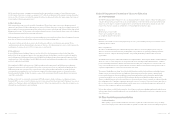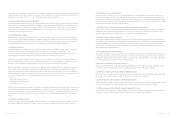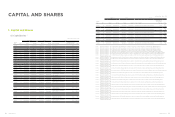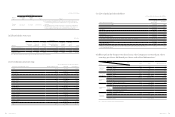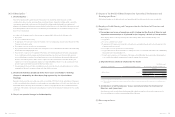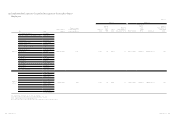HTC 2014 Annual Report Download - page 52
Download and view the complete annual report
Please find page 52 of the 2014 HTC annual report below. You can navigate through the pages in the report by either clicking on the pages listed below, or by using the keyword search tool below to find specific information within the annual report.• Corporate governance Corporate governance •
100 101
and contribute to mutual success. For this reason, HTC inspects the safety and health management conditions at our
contractors every year. A comprehensive labor safety and health management plan is then developed to effectively
prevent the occurrence of occupational disasters. It also participated in the "plan for labor safety and health (LSH) take
root – LSH family login" piloted by Ministry of Labors. A partnership with a total of 16 nearby factories allowed sharing
about experiences in LSH, which effectively improved factors contributing to workplace hazards, safeguarded safety and
health of labors, and enhanced competitiveness of the HTC LSH family.
Initiatives taken by HTC on contractor partners' safety and health management include: Conforming to safety &
health regulations, risk reduction through hazard identification, hazard regulation and management, safety and health
education and contractor management. Full stakeholder involvement is used to mitigate the safety and health risks. New
workers are warned about hazards before they enter the site. These include familiarizing workers with the operating
environment, manufacturing process safety regulations and use of firefighting equipment.
(3) Supply Chain Partners
Suppliers are a vital factor for the continued success of HTC and also are important partners that support our
sustainable development. HTC is committed to fairness and legal compliance in all its conduct towards both consumers
and suppliers and has invested consistently in building a win-win partnership with suppliers through mutual sharing,
learning, and growth.
HTC was founded in Taiwan and is a Taiwanese company whose operations and procurement drives development of
related sectors. Except for certain key parts and components, HTC's general procurement policy is to use raw materials
and equipment originating in Taiwan to the greatest extent possible. We not only require our suppliers to provide quality
services and products, but also measure our supply chain against stringent ethical and environmental standards.
HTC joined the Electronic Industry Citizenship Coalition (EICC) in December, 2012, and drew up the HTC Supplier
Code of Conduct based on the code of conduct issued by EICC. Apart from requiring suppliers to sign the HTC Supplier
Code of Conduct, HTC also implemented CSR compliance audits for high-risk suppliers in accordance with the "HTC
Supplier Code of Conduct" and relevant regulations governing supplier factories. The audits cover labor rights, labor
conditions, environment, safety and health, integrity and ethics as well as the operation of related management systems.
Apart from on-site audits, the HTC audit team plays the role of consultant as well. Suppliers are provided with the latest
information on labor conditions, environment, safety and health in the hopes of elevating them to first-rate sustainable
suppliers.
In 2012, Conflict Minerals was introduced to our supplier CSR audits. On the purchase of mineral ores, HTC supports
the use of non-conflict minerals. HTC and our suppliers do everything possible to ensure that metals such as Gold (Au),
Tantalum (Ta), Tin (Sn) and Tungsten (W) used by HTC do not come from mines located in the conflict region of the
Congo Republic.
HTC supports the U.S. "Dodd-Frank Wall Street Reform and Consumer Protection Act" (H.R. 4173). We have also
joined the joint mining task force setup by the EICC as well as the Global e-Sustainability Initiative (GeSI), and plan to
participate in the EICC/GeSI conflict-free smelter program. At HTC, we require suppliers to conform with our conflict
mineral purchasing policy and reduce the use of conflict minerals. HTC requires suppliers to sign "Conflict Minerals
Survey Form" and "Conflict-Free Material Assurance Letter" documents. These requirements are explicitly defined in
our supplier CSR management process.
According to a report by the Friends of the Earth (FoE), tin mining on Indonesia's Bangka Island has damaged human
rights and the environment. HTC conducted an investigation of our tier-1 supply chain in response to this international
environmental movement and found that while there was no direct use, there were some indirect sources that came
from the tin mine on Bangka Island.
We will therefore accept the responsibility for supply chain management and require our suppliers to avoid its use.
Indonesia however is a major supplier of tin ore and complete non-use may not be avoidable. HTC has now taken action
by requiring suppliers to sign declarations of non-use. Even if they do use ore from tin mines on Bangka Island, it must
be from mines that do not exploit workers, use child labor or cause environmental damage. HTC is committed to taking
responsibility for helping to fix the devastating impact on the environment and people caused by tin mining in order to
ensure the sustainable development of the environment.
HTC will continue to push for responsible ore purchasing and look forward to our suppliers communicating our conflict
mineral-free purchasing policy to upstream suppliers.
(4) Environmental Protection
4.1 Green Products
We go far beyond a consideration of the applicable laws and regulations in the design and development of our
sustainable products. Every stage, from the initial proposal and planning, R&D design, experimental, engineering,
preproduction trials, and mass production, all the way to disposal of the product, is given full Life Cycle Assessment
(LCA) evaluation. We break down the process into very detailed parts, to give our R&D team a complete picture of
the complicated environmental considerations.
We endeavor to minize harm to the environment while making mobile devices that will satisfy our consumers’
needs. To achieve this we strive, from the earliest design and development stages, to select materials for production
with low environmental risk and to exclude all internationally restricted substances. We work diligently to reduce
the use of environmentally harmful substances, to increase recyclability, improve the reuse of resources, and reduce
the adverse effects our products have on the environment.
4.1.1 Sustainable Design
HTC's sustainable design concept for products mainly emphasize the three areas: (1) Increased efficiency, (2)
Recyclability, and (3) Reducing of hazardous substances with the serious intention of making our products really
green and competitive.
1) Enhancement of energy efficiency
By applying the life cycle concept to electronic communications products, our analysis of mobile phone carbon
footprint has found that the manufacturing process emit most of the greenhouse gas .We concentrate on energy-
saving from the early design and research and development phase. All power supplies used for HTC products
must comply with the relevant international energy consumption specifications. All power supply devices used
by HTC must conform to the following international standards:
•Energy Star (U.S.)
•California Energy Commission (U.S.)
•Energy-related Products (ErP)


